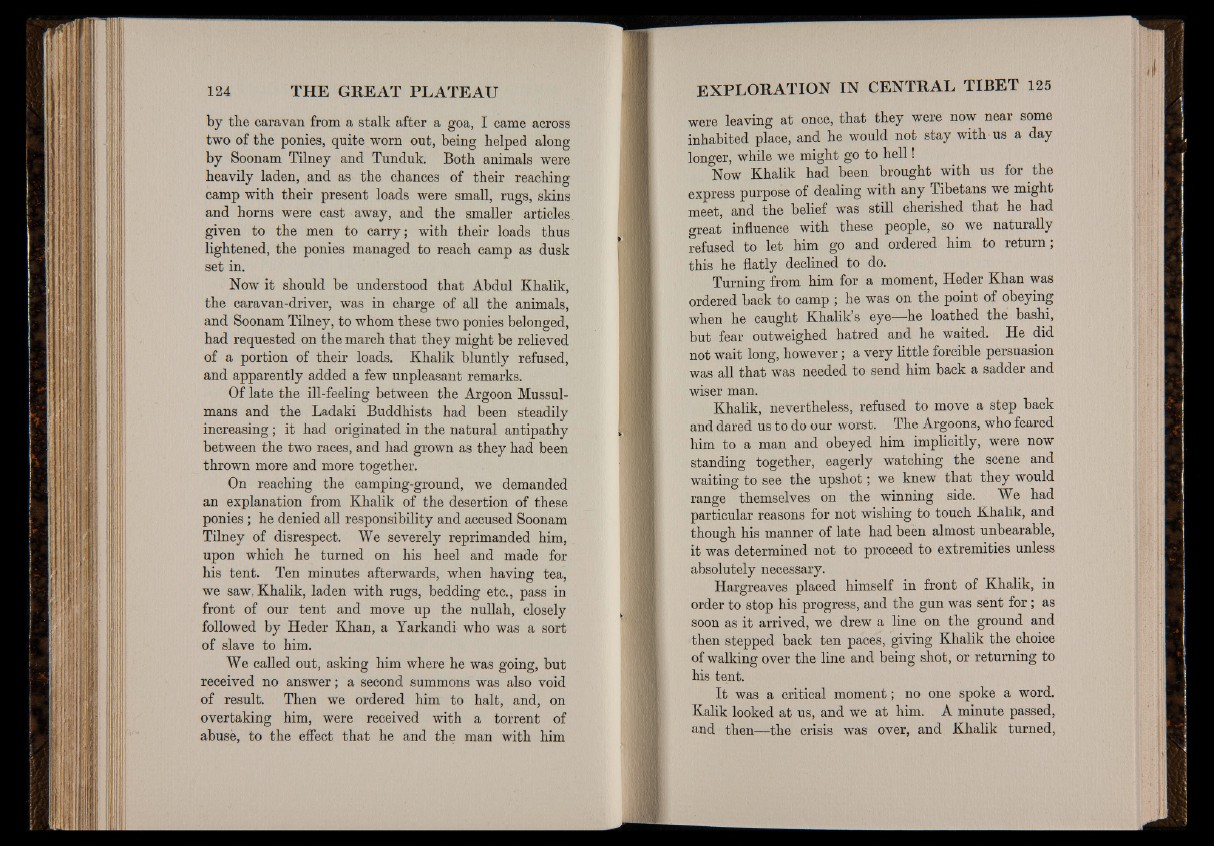
by the caravan from a stalk after a goa, I came across
two of tbe ponies, quite worn out, being helped along
by Soonam Tilney and Tunduk. Both animals were
heavily laden, and as the chances of their reaching
camp with their present loads were small, rugs, skins
and horns were cast away, and the smaller articles
given to the men to carry; with their loads thus
lightened, the ponies managed to reach camp as dusk
set in.
Now it should be understood that Abdul Khalik,
the caravan-driver, was in charge of all the animals,
and Soonam Tilney, to whom these two ponies belonged,
had requested on the march that they might be relieved
of a portion of their loads. Khalik bluntly refused,
and apparently added a few unpleasant remarks.
Of late the ill-feeling between the Argoon Mussulmans
and the Ladaki Buddhists had been steadily
increasing; it had originated in the natural antipathy
between the two races, and had grown as they had been
thrown more and more together.
On reaching the camping-ground, we demanded
an explanation from Khalik of the desertion of these
ponies; he denied all responsibility and accused Soonam
Tilney of disrespect. We severely reprimanded him,
upon which he turned on his heel and made for
his tent. Ten minutes afterwards, when having tea,
we saw, Khalik, laden with rugs, bedding etc., pass in
front of our tent and move up the nullah, closely
followed by Heder Khan, a Yarkandi who was a sort
of slave to him.
We called out, asking him where he was going, but
received no answer; a second summons was also void
of result. Then we ordered him to halt, and, on
overtaking him, were received with a torrent of
abuse, to the effect that he and the man with him
were leaving at once, that they were now near some
inhabited place, and he would not stay with us a day
longer, while we might go to hell t
Now Khalik had been brought with us for the
express purpose of dealing with any Tibetans we might
meet, and the belief was still cherished that he had
great influence with these people, so we naturally
refused to let him go and ordered him to return;
this he flatly declined to do.
Turning from him for a moment, Heder Khan was
ordered back to camp ; he was on the point of obeying
when he caught Khalik s eye—he loathed the bashi,
but fear outweighed hatred and he waited. He did
not wait long, however; a very little forcible persuasion
was all that was needed to send him back a sadder and
wiser man.
Khalik, nevertheless, refused to move a step back
and dared us to do our worst. The Argoons, who feared
him to a man and obeyed him implicitly, were now
standing together, eagerly watching the scene and
waiting to see the upshot; we knew that they would
range themselves on the winning side. We had
particular reasons for not wishing to touch Khalik, and
though his manner of late had been almost unbearable,
it was determined not to proceed to extremities unless
absolutely necessary.
Hargreaves placed himself in front of Khalik, in
order to stop his progress, and the gun was sent fo r; as
soon as it arrived, we drew a line on the ground and
then stepped back ten paces, giving Khalik the choice
of walking over the line and being shot, or returning to
his tent.
It was a critical moment; no one spoke a word.
Kalik looked at us, and we at him. A minute passed,
and then—the crisis was over, and Khalik turned,